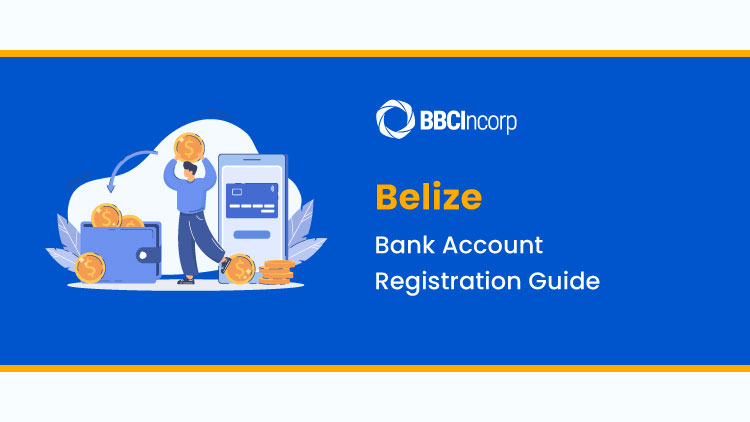Offshore banking in Belize offers people a significant number of benefits including high ratios of stability, privacy, tax optimization, asset protection, and an excellently quickly done and remote registration.
But, the decision is still uncertain to some people as they are not sure about how to open a bank account in Belize, what types of banking are in Belize, and what might be the challenges for banking in this jurisdiction. This blog gives you a specific guide with further clarifications for this matter.
What you should know about Belize banking?
Popular types of banking institutions in Belize
Typically, there are three main types of banking institutions in Belize:
- domestic commercial banks;
- offshore banks; and
- credit unions
Each type of institution has its own unique features and benefits that it can offer customers.
Domestic commercial banks are the most common type of financial institution in Belize, providing a range of services to both individuals and businesses such as loan products for consumers and companies, foreign currency exchange, credit cards, savings accounts, checking accounts, and term deposits. These services help you manage your business finances and make investments for the future.
A Credit Union is a not-for-profit cooperative that provides its members with access to financial services like savings accounts, consumer loans, educational loans, and residential loans at lower costs than banks. Interest rates on savings accounts are typically higher than those offered by banks, while interest rates on loans are usually lower. Credit Unions also tend to have fewer fees and services associated with them when compared to traditional banking institutions.
Offshore banks are financial institutions located outside the jurisdiction of a depositor’s home country, offering financial services to non-residents. Offshore banks can be categorized into different classes, including Class A and Class B. We will provide further clarification of these two categories in the following section.
Differences between Class A and Class B offshore banks
Below are the key highlights you should know:
- Regulations and licensing
Class A offshore banks are typically located in countries with well-established financial regulatory systems, such as the United States, the United Kingdom, and Switzerland. These banks are subject to stringent regulatory requirements and are licensed by well-respected regulatory bodies.
Class B offshore banks are located in countries with less stringent financial regulatory systems and may be licensed by less reputable regulatory bodies.
- Services
Account holders of a Class A bank are free to conduct global transactions, wire transfers, currency exchange, and investments through the bank’s business office in Belize.
A Class B bank account holder, on the other hand, is restricted to certain transactions, investments, and financial services and may have a lower transaction volume.
- Minimum capital
The minimum capital requirement for each category is as follows:
Class A local bank: US$3 million
Class A foreign bank: US$25 million
Class B local bank: US$1 million
Class B foreign bank: US$15 million
- Business office requirement
Both classes require account holders to establish, maintain and operate a physical presence in Belize.
There are only three Class A offshore banks in Belize, including Belize Bank International, Caye International Bank, and Heritage International Bank. Among these, Belize Bank is the largest one but Caye International Bank is the most popular for foreigners, thanks to its leveraged services and relaxed regulatory compliance.
Benefits of banking in Belize
Offshore banking is highly coveted among international investors because of how secure and easy it is to manage their finance remotely. Belize is a good option for those looking for a more accessible banking option to diversify their funding or save up some money for retirement. Let’s take a look at some of the reasons why you should choose Belize for offshore banking.
High liquidity
Liquidity simply refers to a bank’s ability to provide immediate cash or other equivalent assets to handle certain financial obligations or short-term business goals. The higher the number, the more reputable and stable the bank appears in the eyes of investors and the less likely the bank is going to fail.
In Belize, all banks have the same liquidity rate of at least 24% which is significantly higher than what you’ll find in typical American banks. And since the majority of banks in Belize are statutorily required to adopt the same liquidity rate, the odds of one bank’s failure dragging down the rest is extremely low.
This means that there won’t be a massive hysteria where depositors would withdraw their funding in fear of a bank being insolvent leading to a chain reaction. This gives investors peace of mind in knowing that their funding is highly secured and safeguarded from insolvency.
Stable currency
The Belize dollar is pegged at a ratio of 2:1 to the US dollar which serves as a deterrent against unexpected fluctuations. This introduces more flexibility in terms of asset holding as it’s possible to open a bank account in Belize if you want to hedge against inflation. Although volatility will always exist in the market, it’s good to know that you can always count on a stable currency like the Belizean dollar.
Enhanced privacy and asset protection
For the longest time ever, offshore banking was widely stigmatized and considered a vehicle for illicit financial activities. However, times have changed and now there are more international regulations in place to make sure every transaction is done in the most transparent way possible.
The International Financial Services Commission (IFSC) is the current governing body in Belize that is actively regulating and supervising the international financial services sector. One of the more prominent legislative reforms Belize has made throughout the years is the signing of the Tax Information Exchange Agreements (TIEA).
In short, it is a bilateral agreement between the US and more than 100 other countries to freely disclose financial tax information with each other which effectively puts an end to the world of shadow banking and propagate complete transparency within the international financial sector.
Opening a corporate bank account under a Belize LLC can further protect your assets from potential litigations and government seizures. Another good route to go would be setting up a Belize trust that owns the LLC, and the result is an ironclad asset protection structure.




